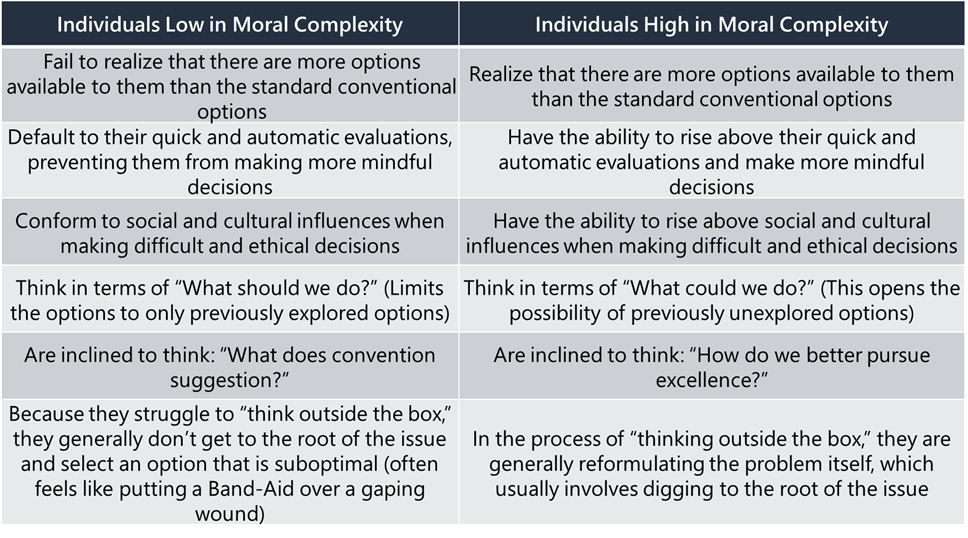In order for leaders to effectively navigate complex situations, they need to become complex beings.
In my academic research, I have come to learn that there are different forms of complexity. There is moral complexity, emotional complexity, behavioral complexity, and leader complexity.
Starting this week, I will be diving into these different forms of complexity. This week, I will focus on moral complexity.
Regardless of the form of complexity, what is important to note that there is a reciprocal relationship between vertical development and complexity:
- As people become more complex, they become more vertically developed
- As people become more vertically developed, they become more complex
By identifying and understanding the different forms of complexity, we can evaluate just how complex we are across these different forms. And, if we find that we aren’t very complex with one form of complexity (at least not to the degree we would like to be), that now becomes an area to focus on for our continued vertical development.
Let me introduce you to moral complexity.
Moral Complexity
Moral Complexity Definition
Moral complexity becomes relevant in contexts where there are competing ethical options. I don’t know about you, but I feel like these contexts are becoming less rare and more common.
Within these contexts, individual that possess moral complexity have the ability to discover solutions to moral dilemmas in a way that does not entail conceding the needs and objectives of one ethical imperative over another.
There are three key elements of moral complexity that are best seen by comparing individuals with high versus low moral complexity. First:

Whether we believe the incompatibility is fixed or not, then shapes the efforts we will engage in to identify potential solutions, as follows:

When one engages in more/less efforts to think divergently, they end up with very different sets of options from which to select from to resolve the quandary. Those with low moral complexity will have fewer options and their options will generally only meet the needs and objectives of only one of the seemingly incompatible moral imperatives. Those with high moral complexity will have more options and their options will be more likely to meet the needs and objectives of all of the seemingly incompatible moral imperatives. This results in:

Pulling these three points together, we can simply say that those with higher levels of moral complexity are more inclined to think outside the box and generate novel solutions to complex problems. And, it all starts with a belief or mindset that their options are not fixed.
Other Key Insights
While the three elements above are the core elements of moral complexity, there are a variety of other benefits and insights related to moral complexity, which include the following:

The Benefit of Moral Complexity
The reality is that just as people differ in height and we can line people up shortest to tallest, people also differ in moral complexity and we can line them up from lowest to highest.
What we know is that the people with the highest levels of moral complexity do the best at wading through complex moral and ethical dilemmas where it seems unlikely that all party’s needs are going to be met. They are able to navigate these situations effectively because they don’t look for the obvious and conventional options. Instead, they are able to explore “outside the box,” reformulate the problem, get to the root of the issue, and come up with options that allow for all party’s needs and objectives to be met.
I don’t know about you, but I imagine that you are with me in thinking: “I wish we had more people in leadership positions that possessed high moral complexity.”
The Key to Improving Our Moral Complexity
Improving our moral complexity is not something that can be done through horizontal development efforts. It requires vertical development. If that is a concept that is new to you, watch this video: What is Vertical Development?
And, if you want to make sure you are engaging in vertical development efforts watch this video: The Difference Between Horizontal and Vertical Development Efforts










